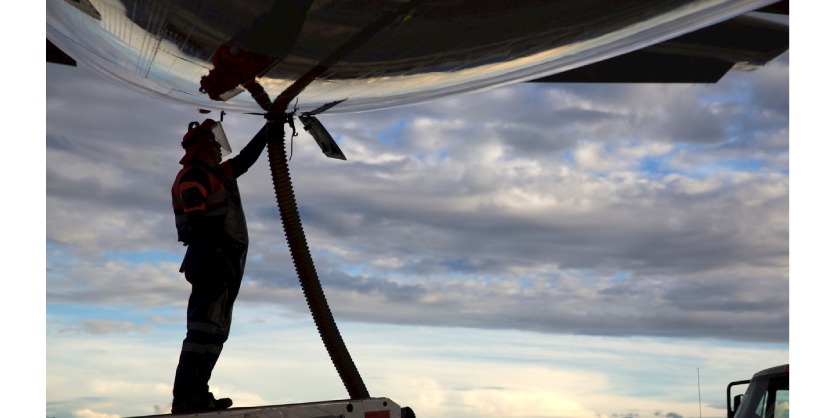ABB and Cap Clean Energy Collaborate to Help Sustainable Aviation Fuel Production Take Off
April 17, 2024

- ABB and Cap Clean Energy sign agreement to support production of sustainable aviation fuels (SAF) in Canada
- Companies will explore how ABB’s integrated automation, electrical and digital technologies can improve efficiency at biofuel facilities
- SAF could contribute around 65 percent of the reduction in emissions needed by aviation to reach net zero in 20501
ABB has signed an agreement with Cap Clean Energy to collaborate on sustainable aviation fuel (SAF) production sites in the Canadian provinces of Manitoba, Saskatchewan and Alberta. As part of the Memorandum of Understanding (MoU), ABB will explore how its automation, electrification and digital technology – including the ABB Ability™ System 800xA® distributed control system and eHouse modular substation solutions – can optimize the biofuel facilities.
Once operational, Cap Clean Energy’s facilities will produce ultra-low carbon SAF from non-combustion conversion of cereal crop by-product feedstocks that do not compete with food. The sites will also incorporate carbon capture and storage (CCS) technology to reduce CO2 emissions.
For the aviation industry to reach net zero targets by 2050, a substantial increase in production will be needed to create the blend of 65 percent aviation fuel required to meet demand, according to the International Air Transport Association1. Progress is being made, with SAF volumes reaching over 600 million liters in 2023 – double the amount produced in 2022 – and an expectation to triple in 20242.
“We are proud to collaborate with Cap Clean Energy and realize our joint vision of driving scale on sustainable fuels as part of the energy transition,” said Brandon Spencer, President of ABB Energy Industries. “The potential for SAF has never been greater, and this agreement demonstrates our commitment to supporting a low-carbon future with innovative clean technology.”
As part of its Tracking Clean Energy Progress 2023 report3, the International Energy Agency (IEA) says aviation accounts for two percent of global energy-related CO2 emissions, having grown faster in recent decades than rail, road or shipping. Currently SAF accounts for less than 0.1 percent of all aviation fuels consumed, so to increase its use to 10 percent by 2030, in line with the Net Zero Emissions Scenario, investment in capacity needs to be ramped up alongside supportive policies.
“We are delighted to collaborate with ABB, which has a long history of delivering integrated automation, electrical and digital technology that drives operational efficiency,” said Steve Polvi, CEO of Cap Clean Energy. “Together, we will work on enabling the production and delivery of SAF and RD into strategic North American markets, supporting society with more sustainable energy and allowing the aviation industry to achieve its net zero goals.”
Cap Clean Energy’s biofuel facilities will be designed as modular systems capable of rapid production scale-up. The concept can then be applied as part of a wider, long-term rollout across a network of integrated and connected bio-refineries.
ABB’s Process Automation business automates, electrifies and digitalizes industrial operations that address a wide range of essential needs – from supplying energy, water and materials, to producing goods and transporting them to market. With its ~20,000 employees, leading technology and service expertise, ABB Process Automation helps customers in process, hybrid and maritime industries improve performance and safety of operations, enabling a more sustainable and resource-efficient future. go.abb/processautomation
ABB is a technology leader in electrification and automation, enabling a more sustainable and resource-efficient future. The company’s solutions connect engineering know-how and software to optimize how things are manufactured, moved, powered and operated. Building on over 140 years of excellence, ABB’s more than 105,000 employees are committed to driving innovations that accelerate industrial transformation. www.abb.com
Cap Clean Energy, headquartered in Calgary, AB, Canada, develops biofuel facilities that upcycle biomass into value-added drop-in renewable liquid fuels. Cap Clean deploys novel development concepts and proven technologies to commercially produce non-food sourced sustainable biofuels that reduce the carbon impact of aviation by more than 90% (or greater than 100% with carbon capture) compared to traditional fossil fuels. www.capclean.com
1 https://www.iata.org/en/iata-repository/pressroom/fact-sheets/fact-sheet—alternative-fuels/
2 https://www.iata.org/en/pressroom/2023-releases/2023-12-06-02/
3 https://www.iea.org/energy-system/transport/aviation‘
Related Story
ABB Provides Power Management System for BHP’s Jansen Potash Project in Canada
ABB has been selected by BHP to deliver a power management system for the Jansen Potash Project in Canada, which will provide nutrient-rich potash fertilizer to enable more sustainable farming globally. The global resource company is progressing the US $5.7 billion Jansen Stage 1 Potash Project which is expected to achieve first production in late 2026.




